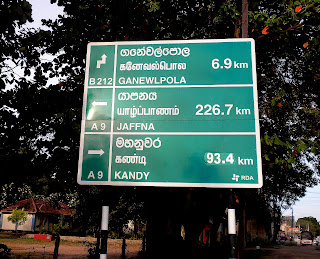It is true that you will find more Sri Lankans who speak English than any other European language. I was told English is the mother tongue of 74000 of them. Others were educated in England and speak a beautiful and cultivated language – upper class British English with a gentle tropical flavor. The written form of this language has a well-educated Victorian polish. Here is part of an article I read in a Sri Lankan English language newspaper – describing the meeting of the journalist with a young shoplifter.
“Ambling down the aisles of the local outlet of a popular Super Market, I saw a little boy of about ten years arriving with his parents. While they did their shopping he was doing a tour of his own, weaving in and out of the aisles and I watched him interestedly as he reminded me of my youngest grandson now domiciled abroad.
He paused at a garland of sachets draped over a rack to finger through them and having made his choice tore one off and moved away. I presumed it was to drop it into his mother’s trolley but I saw him pause, look furtively around and thrust it into one of the many pockets in his pants……. No ten year old, unless a moron, can claim not to know that stealing is wrong. Fancy words and deflecting phrases cannot absolve him of blame; that was the harsh ugly truth.”
No lack of eloquence here. However, a large number of those I came in contact with spoke almost no English beyond “Hello” and “Where from?”
There are two official languages in Sri Lanka – Sinhala, spoken by the Sinhalese majority and Tamil spoken by the Tamils (both Sri Lankan and Indian) . The Moors speak a form of Tamil influenced by the Arabic their ancestors spoke. Offical signs -- like traffic signs -- are in these two languages as well as English.

Since the end of colonialisation, the government, in a successful attempt to increase literacy, changed the language of instruction from English to the two languages spoken by a majority of the people. English has, therefore, become a foreign language like any other except in some private schools. In order to develop international business and tourism, a huge effort is now being made to teach English in the schools and provide “Business English” courses to adults. Over time, I’m sure they will succeed. But they will, no doubt, lose a little of the charm I found in the signs I saw as I made my way around the Island.
Was this sign put up when the British arrived in Kandy?

Do only colonial ladies frequent this park?

Were these signs penned by stern Anglican priests?


This one; at the moat near Sigiriya, is my favorite – English suffused with Buddhist gentleness.

“Beware of crocodiles.” seems so harsh and bureaucratic to me now.
Lynne says,
ReplyDeleteSandy, I read the account of your trip to Sri Lanka with fascination. The history, the acute observations, your charm and humor coloring your clear prose all a turn on. The photos superb. Thank you.
12/29/10
Thank you Lynne. Comments like yours make me feel all warm and happy!
ReplyDelete